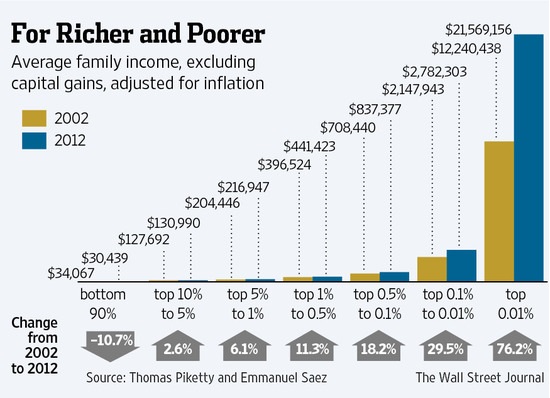Proximity Is Destiny
June 28, 2017
Privilege is unearned proximity to power in all its manifestations.
My friend G.F.B. recently coined an insightful maxim: Proximity Is Destiny. The power of this concept lies in its unification of physical proximity and abstract proximity.
We all understand physical proximity can be consequential. As the Titanic settled lower in the ice-cold Atlantic, those close enough to the lifeboats to secure a seat (mostly the first and second class passengers) lived and those who were not died.
College graduates seek internships at the most successful companies because they know the connections they make by working within the headquarters might lead to a job offer: physical proximity to movers and shakers (and those with the power to hire) is destiny.
But proximity to abstract manifestations of power is even more consequential in an economy/society in which wealth and power are predominantly abstract. For example, getting an internship in the Federal Reserve doesn't mean you can obtain proximity to the Fed's money/credit spigot as a result of your physical proximity to the building or staff: the really powerful proximity--being close to the Fed's money/credit spigot--is entirely abstract.
Abstract proximity is structural, and often invisible. We can't discern an individual's proximity to money/ credit/ privileged-information spigots by their physical locale or appearance, though we may infer their income/wealth from various status signifiers.
But signifiers don't tell us much about abstract proximity. Two individuals may own the same status signifiers, but one earned them the hard way, and the other had the advantage of proximity to insider information.
Privilege is much in the news recently, and I wrote a short book exploring the nature of privilege: Inequality and the Collapse of Privilege. The point of the book is this: privilege requires a centralized power hierarchy, as only a centralized power hierarchy can impose or nurture privilege, often through informal power structures.
Privilege is unearned proximity to power in all its manifestations: in our world of abstract structures of power, privilege often appears informal, masking its structural nature.
This informality enables a useful (to the privileged) confusion of privilege and merit. Two individuals may appear to enjoy similar status--both own homes in upscale neighborhoods, drive luxury vehicles, vacation in exotic locales, own second homes, belong to churches, temples, clubs, charitable organizations, etc. well-stocked with wealthy, influential people, etc., but the sources of their status are very different.
One was handed all this by family connections and inherited wealth, while the other worked his/her way up from humble beginnings. The individual who managed to work his/her way up the social-mobility ladder needed proximity to opportunity, and might have been helped by mentors and plain old luck, but privilege played a relatively modest role in the journey, as millions of other people with similar social status had roughly similar proximity to opportunity.
This inherent difficulty in differentiating privilege from merit allows the privileged Elites to claim their advantageous position is all due to merit: I worked harder than the other guy, etc., when in fact it was proximity to abstract privilege and power that lofted them to the top of the pyramid.
The Power Elites always have need for hard-working, smart, honest strivers to serve their enterprises and institutions, and so they recruit non-privileged strivers to their inner circles: prep schools, elite universities, prestigious organizations, the "right" church, temple, etc., internships in higher management, scholarships, foreign postings that serve to quickly advance careers, and so on.
This proximity is very close to what they offer their own offspring. But there's a difference, of course; their offspring can be dull-witted and lazy, and they will still get access to all these advantages.
And there is another unstated difference: the merely merit-based striver will not be invited to private gatherings, nor encouraged to find a mate in the Elite class.
Proximity is destiny, and it's proximity to abstract but very real structures of privilege, power and capital that count.
As I detailed yesterday, proximity to the flow of cheap credit creates fortunes, fortunes that aren't earned via merit, innovation, genius or the creation of new goods and services; proximity to cheap credit is the core dynamic of rentier skims based on the acquisition of income-producing assets.

With sufficient income and capital, you also gain proximity to the machinery of governance--our pay-to-play "democracy" in which influence can be bought to benefit the few at the expense of the many.
Proximity is destiny. To understand this, we must first illuminate the abstract
structures that enable proximity to the abstract but oh-so-real levers of privilege,
power, wealth and influence.
If you found value in this content, please join me in seeking solutions by
becoming
a $1/month patron of my work via patreon.com.
Check out both of my new books, Inequality and the Collapse of Privilege ($3.95 Kindle, $8.95 print) and Why Our Status Quo Failed and Is Beyond Reform ($3.95 Kindle, $8.95 print, $5.95 audiobook) For more, please visit the OTM essentials website.
NOTE: Contributions/subscriptions are acknowledged in the order received. Your name and email remain confidential and will not be given to any other individual, company or agency.
|
Thank you, Ajay C. ($50), for your marvelously generous contribution to this site -- I am greatly honored by your support and readership. |
Thank you, Joshua S. ($20), for your most generous contribution to this site -- I am greatly honored by your support and readership. |

Discover why Iím looking to retire in a SE Asia luxury resort for $1,200/month. |